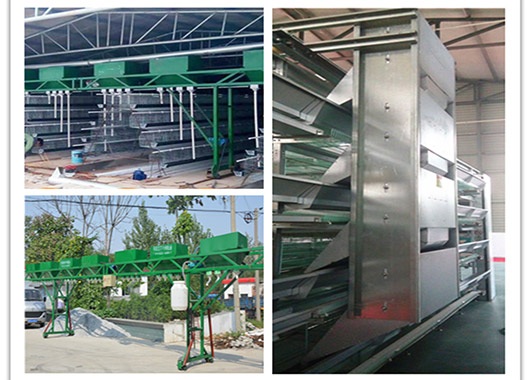How do farmers raise chickens in chicken farm?
- Published in Poultry raising equipment
Feeding chicks is a very important thing, only the chickens that are raised will bring better economic benefits. So what should be done to raise chicks in battery cage for broilers?
The right temperature is the key to breeding chicks. Therefore, in the brooding period, it is necessary to give appropriate temperature according to the age of the chicks, and it is necessary to be flexible according to different situations. The general principle is that the initial stage should be high, and the later stage should be low; the weak chick should be high, the strong chick should be low; the small group should be high, the large group should be low; the cloudy day should be high, and the sunny day should be low: the night should be high, the day should be low; the winter should be high In summer, it is low; the broiler chicken should be high, the breeding breeder should be low, the slow-feathering chicken should be high, and the fast-feathering chicken should be low. The chick temperature standard is: just out of the shell to 1 week of age, 30-32 ° C is appropriate, every full week can be reduced by 2 ~ 3 ° C, until 4 weeks of age to 21 ° C. But don't go below 20 °C. In short, it is appropriate to use the chicks not to pile up, not to stick their tongues, and to disperse evenly.
The relative humidity in the first week is 70% to 75%. The second week fell to 65%. Try to stay at the level of 55% to 60% after the second week. Excessive humidity is conducive to the reproduction of pathogenic microorganisms. It is easy to induce coccidia, aspergillosis, etc.: the humidity is too low, the chicken house is dry, and the chick's hair is brittle. The toes are dry. Excessive drinking water, loss of appetite, affecting growth and development. The improvement method is to spray a small amount of water on the inner wall or aisle to evaporate the water to achieve the purpose of adjusting the humidity. In the brooding room, the feces should be removed, and the litter should be changed frequently to keep it clean.

The purpose of ventilation is to drain the poisonous gas in the house and let the fresh air pass. The time for ventilating chicks should generally be selected at a high temperature at noon. The louvers that are usually facing south should be kept open. When the weather is cold, the louvers on the corridor or ceiling can be used for ventilation. Or replace the glass of the south facing window with a piece of linen to keep the air flowing. Mechanical forced ventilation can be used conditionally.
Light can promote chicks to eat and drink. Increase exercise, promote muscle and bone growth and development, prevent diseases, and improve future production performance. Young chicks out of the shell 3 d. Generally use 23 or 24 h of illumination. The intensity is 10.76 LX, which is 0.37 m2 with a light source of 1 W. 1 W per square meter after the fourth day. 0.5 W per square meter after the second week. At night, the light can be stopped from time to time, and the chicks can adapt to the darkness to avoid the power outage and cause the chickens to be uneasy. Affect chicks' sleep. Turning on the lights at night can also prevent the thunder caused by rodents and prevent mosquito bites in summer. It should be especially emphasized that from the time of shelling to 18 weeks of age, the time and intensity of light can only be gradually reduced and cannot be increased.
Must be flexibly controlled according to variety, season, gender, house structure, ventilation conditions, etc. Excessive density will limit the activity of the chicks, affecting growth and development, and causing serious air pollution. Also, due to the increase in humidity, the body heat is difficult to dissipate, causing the chicken to become stuffy and causing convulsions, the feed conversion rate is lowered, and the mortality rate is increased. If the density is too small, the equipment costs are large, the labor is increased, and the breeding cost is high.
Disease prevention is an important guarantee for raising chicks in Chicken Battery Farm Equipment For Sale. The young chicks are small, weak in disease resistance, and densely reared. Once the disease occurs, the control is difficult, the spread is fast, the death is much, and the loss is large. Therefore, after each feeding, the utensils should be rinsed clean and disinfected with disinfectant, usually do a good job in the brooding room and surrounding sanitation. The litter should be changed to work diligently. In order to clear the chicken manure, keep the indoor air fresh. The chicks should also be regularly epidemic prevention, and the epidemic situation should be discovered, diagnosed in time, and extinguished in time.
